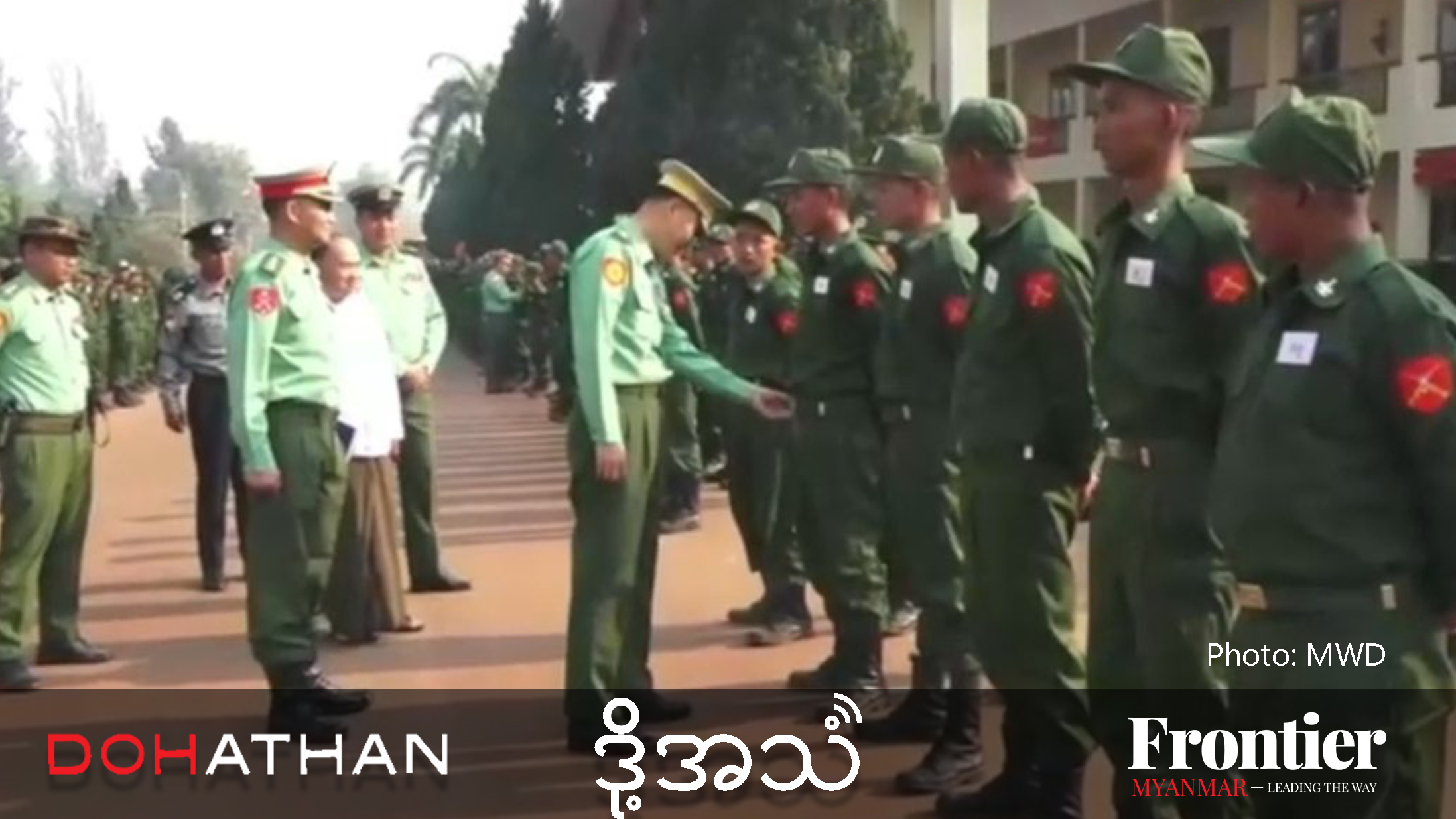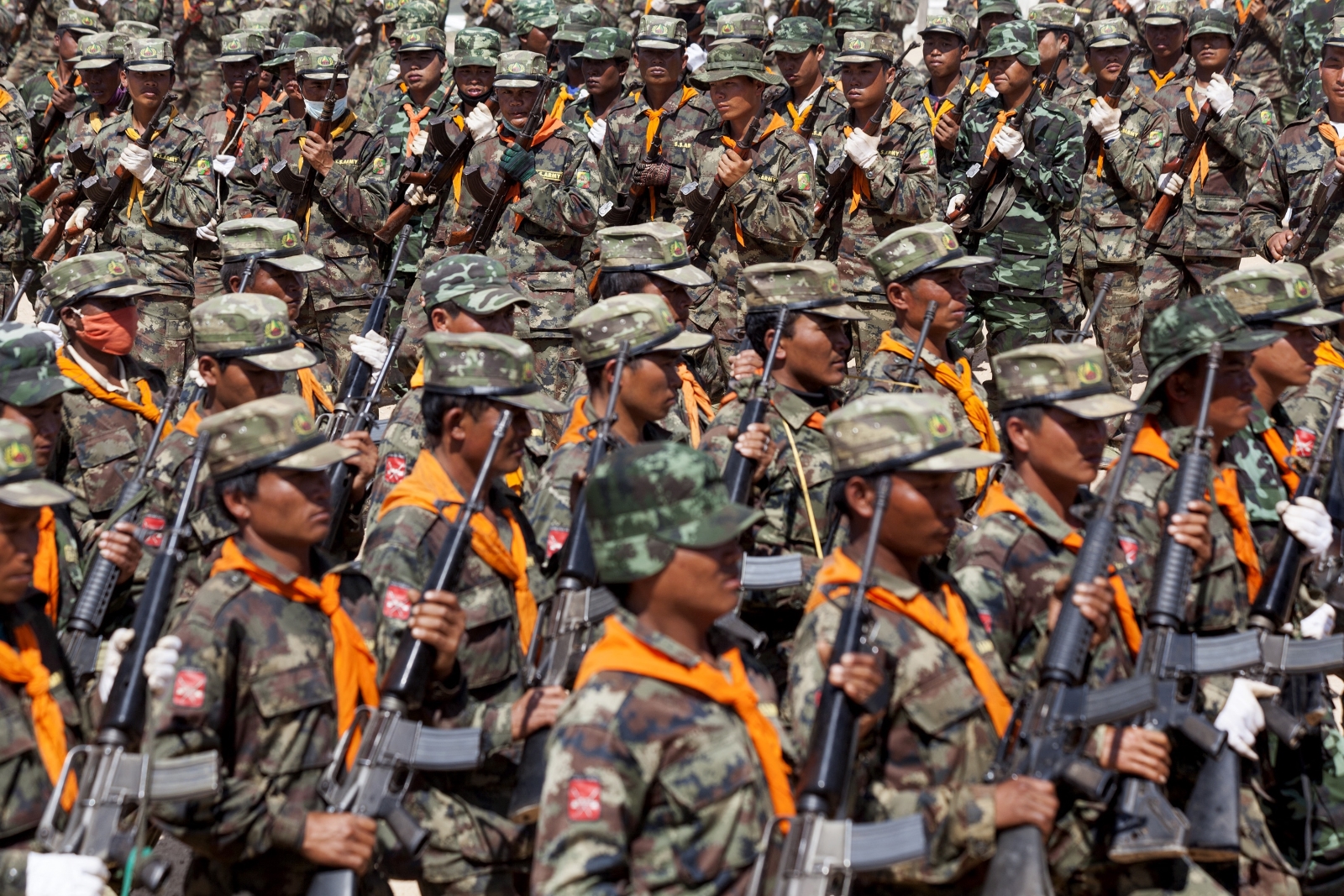The former ruling party and 12 other parties have generated controversy by seeking a meeting of a powerful, military-dominated panel that is empowered under the constitution to run the country during an emergency.
By SITHU AUNG MYINT | FRONTIER
THERE WAS a controversial and ominous development last week: the demand made to the government by the former ruling Union Solidarity and Development Party and 12 other parties to call a meeting of the powerful National Defence and Security Council to discuss the crises in Rakhine State and northeastern Shan State.
The demand, in a statement issued on November 28, said a meeting of the NDSC was needed because the crises had put the country’s territorial sovereignty was at stake.
It is hardly a secret that the ruling National League for Democracy and an overwhelming majority of the people do not like the 2008 Constitution, which provides for the military to hold 25 percent of hluttaw seats and a majority on the 11-member NDSC. The NLD had promised to amend the constitution if it was elected.
Section 417 of the constitution provides for the President to convene a meeting of the NDSC and order a national state of emergency if the Union faces potential disintegration or loss of sovereignty through violence. The NDSC comprises five senior military officers and six civilians, including President U Htin Kyaw and Daw Aung San Suu Kyi, in her capacity as foreign minister.
Support more independent journalism like this. Sign up to be a Frontier member.
However, the civilian cohort includes the vice presidents, one of whom is nominated by the military, giving the armed forces an effective majority. The NDSC holds legislative, executive and judicial powers during a state of emergency.
Why did the 13 parties issue their statement calling for a meeting of the NDSC? Is the NLD government able to overcome the problems described in the statement? Is it probable that the Tatmadaw would try to return to the political stage? These are questions I’d like to discuss this week.
The 13 parties said a meeting of the NDSC was needed because the country was facing a crisis over the security situation in Rakhine and the fighting in northeastern Shan State. Their statement said the country’s territorial situation was at stake because of the situation in Rakhine. In Shan, the fighting between the Tatmadaw and the Kachin Independence Army, Ta’ang National Liberation Army, Myanmar National Democratic Alliance Army and Arakan Army has resulted in death and destruction and disrupted trade with China.
The security operation in northern Rakhine began after Muslim militants attacked Border Guard Police posts in early October, leaving nine officers dead and seizing arms and ammunition. However, the attackers were armed only with swords and sticks, not with modern weapons.
Bangladesh deserves praise for its response to the situation across the border in Rakhine. It has not interfered in Myanmar’s affairs and has cooperated in a good-neighbourly way. It has handed over militants and has promised it will never allow its territory to be used as a base for attacks against Myanmar. The cooperation from Bangladesh will help the Tatmadaw in its operation to restore peace and security to northern Rakhine sooner or later.
In northeastern Shan, the KIA and its Northern Brotherhood allies said they launched their attacks in Muse and Kutkai townships to draw attention to recent “pressure” from the Tatmadaw. Although the Tatmadaw suffered casualties, there was no move by the Northern Brotherhood to seize towns or villages.
The main objective of the attacks was to disrupt border trade and the movement of the people. The Tatmadaw is meeting its responsibility to restore law and order in the affected area. Myanmar is not in danger, or even on the brink of danger.
State Counsellor Aung San Suu Kyi and Tatmadaw Commander-in-Chief Senior General Min Aung Hlaing meet occasionally, when the circumstances require it. The ministers of defence, home affairs and border affairs, all of whom are military officers and members of the NDSC, are consulted during cabinet meetings.
Section 213(a) of the constitution says that the President has the right to take military action, in coordination with the NDSC, in the event of aggression against Myanmar.
It is within the authority of the President to call a meeting of the NDSC. However, there is no need to do so at the moment. Myanmar is not being invaded and government ministers who are members of the NDSC, as well as senior members of the Tatmadaw, are closely following and discussing the national situation.
The USDP is the creation of military dictators. A USDP government, comprised of former generals, led by President U Thein Sein and created by former dictator Senior General Than Shwe, took power in 2011 under the terms of the military-drafted 2008 Constitution.
The NLD landslide in the 2015 delivered a humiliating defeat to the USDP and most of the other 12 parties that signed the statement. Could it be that in criticising the NLD government’s handling of the crises in Rakhine and northeastern Shan, and calling for a meeting of the NDSC, the USDP-led group is hoping for a U-turn to a military government? Is it possible that they want to reverse history and take Myanmar back to dictatorship?






